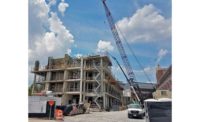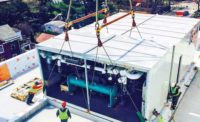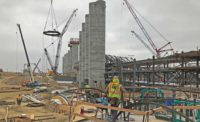Specialty contractors in Arkansas, Louisiana, Mississippi, Oklahoma and Texas reported strong performances during 2019, according to the results of ENR Texas & Louisiana’s annual Top Specialty Contractors survey.
The leading 50 specialty firms in the five-state area posted total revenue of $10.52 billion in 2019, up from $9.24 billion for the top 50 in 2018. This vitality continued into the first quarter of 2020 before the ongoing pandemic impacted firms and generated concerns about the outlook. In Texas, “the industry was running on all cylinders in 2019. Work was plentiful in both the industrial and commercial sectors, and everyone had plenty of backlog,” says Russell Hamley, president of ABC (Associated Builders and Contractors) Greater Houston. “The main problem was a shortage of skilled workers to build the projects.”
Last year was also “steady for most in the energy infrastructure industry, and for us, it proved a banner year, with continual work for our crews in 2019 and into 2020,” adds Jason Heckt, executive vice president for The Woodlands, Texas-based STRIKE. In 2019, the firm completed the Midship Pipeline in Oklahoma, the Gulf Coast Express Pipeline from Del Rio to Agua Dulce, Texas, and the EH2H from Houston to Hearne, Texas. Together, the projects generated $600 million in revenue for STRIKE.
In neighboring Louisiana, it was a “fairly standard year in 2019, with decent growth and activity in both industrial and commercial construction,” says Jeb Bruneau, president and CEO, ABC of New Orleans/Bayou in St. Rose. “Many of our members were busy with work, and the pipeline leaned positive.”
Since the state experienced a slowdown in the oil and gas sector, related construction activity ticked down. But industrial plant construction remained active and several large projects were planned. “On the commercial construction side, both the private and public sector saw moderate growth, and most of our specialty contractors were fairly busy,” Bruneau says.
Looking north to Arkansas, contractors also had a “great year” in 2019, says Bill Roachell, president of ABC of Arkansas in North Little Rock. “Construction had exciting things going on, and our members roared into 2020.” The northwest region of the state was particularly robust, exemplified by the ongoing Walmart global headquarters in Bentonville, a project that Roachell estimates at $3.5 billion to $5 billion. In addition, central Arkansas benefited from two Amazon contracts in the Little Rock area—a 825,000-sq-ft fulfillment center, an estimated $100-million project scheduled to open late 2021 or early 2022, and an 85,000-sq-ft “last mile” distribution center, an estimated $11.2-million project opening in late 2020.
ACE Glass, the state’s largest glass company, had more work in 2019 than ever, says Courtney N. Little, principal of the Little Rock-based company that his parents founded in 1986. “It actually hurt us because we weren’t prepared for the growth. The construction market was probably overheating in 2019 as evidenced by the lack of materials and skilled labor.”
Commercial construction in Oklahoma was strong in 2019, says John Smaligo, president and CEO of ABC Oklahoma in Broken Arrow. “Contractors of all scopes and sizes capitalized on a strong economy and less bureaucratic red tape from the federal government,” he says. “The biggest hurdle for specialty contractors during 2019 was finding skilled workers to complete all the projects.”
In Mississippi, specialty firms performed strongly all year. “We were experiencing the same economic expansions as the rest of the country across various sectors, which served the market well during that time frame,” says Lee Nations, president and CEO of the ABC chapter in Jackson.
Over in Bolton, Miss., Metro Mechanical, a 150-employee mechanical and plumbing contractor, “had a good backlog and were building profit margins with private work that continued to grow. We were looking good for 2020,” says CEO Frank White.
|
Related Link |
COVID-19 Disruptions
After the COVID-19 pandemic began in March, some firms were able to keep everyone working, including Metro Mechanical. “We’re having a good year because of a record amount of backlog,” White says, noting that military, government and medical projects are ongoing, but private work, generally, is on hold.
“We didn’t have a lot of slowdown,” adds Roachell for ABC Arkansas. “Our pipeline of work was good, and our specialty firms have weathered this well. Some of our projects were delayed, some shut down for a couple of weeks but not many were canceled.”
However, large market areas had to confront the almost total shutdown of travel and hospitality and an oil and gas sector slowdown. In Houston, almost all projects continued in the early stages, but “as the length of disruption grew, more projects were slowed down or stopped,” Hamley says. “As the pandemic continues, more projects are placed on hold as owners are reluctant to start new projects until some certainty is seen on the horizon.”
“When I ask contractors what they think about the outlook for 2021, the phrase that seems to encapsulate their responses is ‘guarded optimism.’”
– John Smaligo, President & CEO, ABC Oklahoma
Two positive results include a relaxation in the skilled worker shortage and a thriving home-building market. “Some skilled craftworkers will be able to find employment in those trades when their jobs are ended,” Hamley says.
In Louisiana, as the virus continued, many projects were held or shelved and area subcontractors suffered, Bruneau says. Still, two major projects that continued on in 2020 include the $1.1-billion Valero Green Diesel project in St. Charles Parish and the $530-million Four Seasons Hotel on the New Orleans riverfront.
In Oklahoma, Smaligo says that 2020 has been a “mixed bag for specialty contractors. Government-funded projects, especially roads and bridges, largely remained on schedule, but some of the private work was put on pause or even stopped altogether.” But specialty contractors doing residential projects have seen business boom during the pandemic, he says. Major projects underway include the $600-million Google data center in Pryor and the $25-million OKPOP museum in Tulsa, scheduled for completion by the end of 2021.
David Funes, director of business development for Baton Rouge-based Newtron Group, an electrical and instrumentation contractor, says that after a robust 2019, “we had some projects interrupted, some postponed and others cancelled [as a result of the pandemic]. Things have started to improve, but it remains slow.”
Nations notes that once the construction industry was declared essential, and “we recognized we could work through the issue, the remainder of 2020 seemed to stay fairly positive.” Work included the October 2020 completion of the $150-million Children’s Hospital at UMMC in Jackson, led by general contractor Brasfield & Gorrie. “Everyone across all trades seemed to fare well for 2019 and 2020,” says Nations.
Recovery or Recession
The ability of the Biden administration to quickly respond to the needs of the construction industry as well as the arrival of an effective COVID-19 vaccine will determine if 2021 delivers stability and recovery rather than recession.
“When I ask contractors what they think about the outlook for 2021, the phrase that seems to encapsulate their responses is ‘guarded optimism,’” Smaligo says. “Most contractors have a decent backlog, but they worry about the third and fourth quarters. One major concern now and into the future is their materials supply chain—in particular, cost and availability.”
Nations adds that “we will have to wait and see how the private market reacts to any immediate policy decisions by the new administration. I think ultimately this will drive private market investment decisions, which in turn feed our construction employers.”
Meanwhile, STRIKE’s leadership is optimistic about the energy sector, “even though we anticipate a tight market in 2021,” Heckt says. “Our ability to provide turnkey engineering, pipeline and facility infrastructure services, with a focus on integrity and maintenance, will be a primary driver moving forward.”
Hamley observes that “if a few things break right—including a vaccine quickly deployed and decisions on fracking and energy usage—specialty contractors may be able to continue business without much effect of a downturn. Once people can gain the confidence to resume a normal lifestyle, the economy will jump-start, and projects on hold will be released. If those things do not happen, we could be in for a prolonged slump.”







